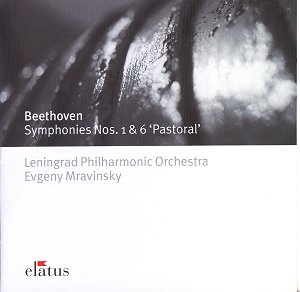To the best of my knowledge an all-Russian complete
Beethoven cycle has never been attempted. The nearest would be
the Western-based Paul Kletzki who recorded all the symphonies
for Supraphon with the Czech Philharmonic. Mravinsky’s posthumous
career on records has burgeoned in a manner similar to Furtwängler’s,
with discs appearing from a variety of sources and covering quite
a range of repertoire. Here we have late Mravinsky (he was 79
when these performances were recorded and had been conductor of
the Leningrad PO for 44 years) in generally vivid sound, I suppose
by courtesy of the local radio station. There is a certain rasping
quality to the wind as recorded which we used to think of (in
the famous Tchaikovsky recordings for DG) as quintessentially
Russian, though Mariss Jansons (who ought to know) said it was
due to the fact that the players were too poor to afford high-quality
instruments. If that is so, they did wonders with them since the
actual tonal shading is masterly. This is just as well in the
case of the clarinettist in the "Pastoral" since the
recording engineer either thought he had been engaged to record
a clarinet concerto or else was a blood-relation of the player
and determined to preserve his contribution for all time. The
player withstands this close scrutiny but it would have been nice
to have had Mravinsky’s own balance. Other Mravinsky recordings
of these works may or may not exist for better or for worse, but
his interpretations can be judged without serious problems.
The First Symphony offers a nice balance between
Beethovenian ebullience and Mozartian grace. It is notable for
a complete clutch of repeats (including the first repeat of the
Scherzo in its return after the Trio), a swift minuet-like tempo
for the second movement (which Beethoven asked for) and a rather
steady third movement (which he didn’t but which permits the Trio
to follow without any slackening of the pulse).
It is odd that the "Pastoral" is shorn
of its first movement repeat, given Mravinsky’s scrupulousness
in the First Symphony, but the performance is well worth hearing.
The conductor’s fanatical insistence on innumerable rehearsals
of standard repertoire pieces pays dividends in his control over
the crescendos and diminuendos in the first movement which is
unhurried but forward-flowing and very fresh. The second movement
is kept on the move, not as fast as Weingartner’s but not far
off Beethoven’s own marking, and Mravinsky’s dynamic shading makes
for exceptional formal clarity. The Scherzo is swift and buoyant
with the tempo whipped up for the "contredanse" sections;
a contrast which Beethoven asked for but which Weingartner for
some reason levelled out. The Storm is fast and thrilling, with
the conductor’s superb control over dynamic shading ensuring that
every detail is clear. After a very poetical lead into the Finale,
Mravinsky’s shaping of the string melody is quite wonderful, simple
yet with the infinitely subtle shading we more often associate
with single performers than entire orchestras. I wonder how much
rehearsal time went into this. At a tempo close to Beethoven’s
own, Mravinsky finds breadth, warmth and also great vitality in
this movement, which therefore crowns a performance which belongs
high in the work’s discography.
Mravinsky’s Beethoven is here revealed to be
of considerable importance and completely idiomatic. One wonders
if it could be brought together systematically. An Internet search
produces the following:
1: 1982 (the present performance)
2: 1940
3. 1961, 1968
4. 1949, 1955, 1972, 1973
5. 1949, 1963, 1971, 1972, 1974
6. 1949, 1962, 1982 (the present performance)
7. 1958, 1964
The information comes from a Mravinsky discography
and refers to performances that have actually been issued at one
time or another (Elatus have also released a coupling of the most
recent versions of 5 and 7, reviewed for the site by John Phillips).
Is there more to discover? Mravinsky programmed the 8th
Symphony at least twice in 1942/3 while the orchestra was exiled
in Siberia (for safe keeping during the war years, not to work
the salt mines!). During this period they gave 538 concerts, over
200 for the radio. Does any of this survive? And did he ever conduct
no.9, or was Schiller’s text too subversive for the Soviet authorities?
Christopher Howell

